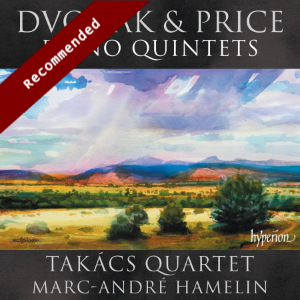
Florence Price (1887-1953)
Piano Quintet in A minor (c.1936)
Antonín Dvořák (1841-1904)
Piano Quintet in A major, Op. 81 (1887)
Takács Quartet, Marc-André Hamelin (piano)
rec. 2024, Concert Hall, Wyastone Estate, Monmouth, UK
Hyperion CDA68433 [67]
I cannot think of a better coupling for chamber work masterpieces than this disc of Florence Price’s and Antonín Dvořák’s piano quintets, especially when performed and recorded as well as they are on this disc. It matters not in the least that Price’s work has much in common with the period of the Czech master, because hers was an original and convincing voice. While there are plenty of excellent accounts of Dvořák’s opus 81, Price’s oeuvre has been discovered recently, and her star is rising. One of the three recordings of her Quintet was enthusiastically received here (review ~ review).
The story of Florence Price is by now well-known. Misha Donat’s booklet essay discusses the background for the Piano Quintet and ably describes its structure. I was impressed with Price’s String Quartet No. 2 (review), and I find the Quintet even more inspired. The medium of chamber music with strings appears to have suited her talent better than the pretensions of the symphony (based on my experience listening to her works in that genre). Like in her quartet and symphonies, Price substitutes a Juba, a syncopated dance associated with plantation slaves, for the more traditional third-movement scherzo. Donat aptly compares the rhythm of the Juba to a cakewalk – think Debussy’s Golliwog’s Cakewalk from the Children’s Corner suite.
The Takács Quartet wholly live up to their illustrious reputation. I was pleased to acknowledge this after their rather disappointing outing in Dvořák’s American String Quintet and accompanying String Quartet, Op. 105 (review). In Marc-André Hamelin, they also have one of today’s outstanding pianists.
The first movement of Price’s work, in sonata form, is almost as long as the other three together. Its melodies evoke Black American culture while showing Dvořák’s influence. Some of the modulations also remind me of César Franck. Overall, however, it has the signature we have come to expect from Price. The piano part is well integrated with the strings, but with virtuosic passages. There are notable string solos, too.
There follows a beautiful song which employs the pentatonic scale. Dvořák-influenced again, it also has the character of a Negro spiritual. After the short jazzy Juba, the work concludes with a light-hearted, tuneful Scherzo, ending on an A minor chord. I have not heard the Kaleidoscope Chamber Collective’s account on Chandos, but I doubt it would surpass this stunning recording.
There is much more competition for Dvořák’s popular Piano Quintet in A major. Even so, I have no hesitation in singling out this version as one of the best. I have long admired the performance by Rudolf Firkušný and the Ridge String Quartet on RCA – more because of his splendid pianism than because of the string quartet. Good as they are, they are simply not in the same class as the Takács. The RCA sound is very close and the recording level high, so one must lower the volume to achieve a more natural presence. Also, theirs is a plainer account with little rubato, whereas the Takács at times indulge in a more nuanced, Romantic interpretation with occasional portamento and a broader dynamic range.
From the lovely cello solo with which the quintet commences, to the sad and melancholy Dumka, the lively Scherzo and the breezy finale, the Takács and Hamelin provide listening pleasure in spades. Their instrumental blend is impeccable. They really capture the excitement of the Dumka’s contrasting fast, dance-like section. Hamelin’s touch and technique are phenomenal all along. The slow passage near the end is moving and deeply felt, and the last two notes are cleanly articulated.
I would not want to be without Firkušný’s account, but I will undoubtedly return to this one first when I want to hear this amazing work. With Price’s quintet as a companion in an equally winning performance, this is an essential acquisition.
Leslie Wright
Buying this recording via a link below generates revenue for MWI, which helps the site remain free


















